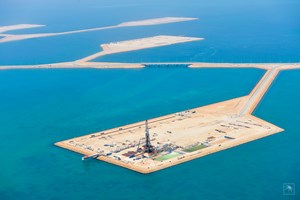What all that oil really means for the Saudis
NEW YORK (Bloomberg Opinion) -- In case you didn’t know it, Saudi Arabia is sitting on top of a lot of oil. The first independent assessment of reserves in about 40 years has just proved it. The question is how the kingdom ensures that most of it won’t still be there when the world no longer wants or needs it. Producers in the rest of the world had better pray it doesn’t decide to solve the problem.
The two-and-a-half-year study by Dallas-based consultant DeGolyer and MacNaughton is the first since Saudi Aramco was nationalized. It confirmed proved oil reserves at the end of 2017 at 263.1 bbbl. That’s a little higher than Saudi Aramco’s own assessment of 260.9 Bbbl. Both see a further 5.4 Bbbl from Saudi Arabia’s half of the Neutral Zone it shares with Kuwait.
The audit comes as the kingdom doggedly pursues an IPO of the state oil company. This goal has already attracted no small amount of skepticism, some of which stems from long-held distrust about official reserves numbers.
Saudi Arabia and other Persian Gulf countries have long been viewed as having inflated reserves assessments in the 1980s for political reasons. The Big-Five Persian Gulf OPEC nations and Venezuela all announced huge increases in between 1982 and 1988, a time when the group was seeking to develop a methodology for allocating output quotas. One of the proposals was to base them on reserves.
Over that period the six countries increased their proved reserves by 86%, without any significant increase in exploration. Their share of total worldwide oil reserves rose to 68% in 1988 from 56% five years earlier. Since then, reserves have remained remarkably stable, even though those countries pump roughly 10 Bbbl out of the ground each year.
The revisions of the 1980s could simply have reflected the countries catching up on previous discoveries that had not been made public after they gained control over their own oil sectors. Even so, with reserves in excess of 100 Bbbl and industries dominated by state-owned oil companies, there was no incentive, or requirement, to provide independently audited reserves figures each year. In Saddam Hussein’s Iraq, reserves and discoveries were state secrets and revealing them was a capital offense.
The Aramco IPO has forced a change of tune. The assessment not only lays to rest suspicions about the veracity of early numbers, it also confirms Saudi Arabia as the holder of the world’s largest reserves of conventional crude. Only Venezuela has more, but almost 75% of that is the extra-heavy oil in the Orinoco Belt, which is expensive and carbon-intensive to produce and turn into usable products.
But what is oil in the ground really worth? This valuation is another bone of contention in the IPO. Until about a decade ago oil was regarded as a depleting resource. It was argued, particularly by those countries with large reserves, that the value of what was in the ground could only rise, as country after country depleted its geological inheritance and global demand continued to increase, while resources became more scarce.
That has now changed. The greater fear in the second decade of the 21st century is that some of those reserves will never be produced at all, making them worthless. Global oil demand is now expected to peak sometime before 2050 and then go into reverse, while the ability to extract from shale has opened up huge potential new sources of supply. Sales of traditional internal combustion engine (ICE) passenger vehicles may already have peaked, according to BloombergNEF.
Saudi Aramco’s CEO isn’t worried though. “We must push back on the idea that the world can do without proven and reliable sources” of energy, Saudi Aramco Chief Executive Officer Amin Nasser said at the CERAWeek by IHS Markit conference back in March.
But it is only once oil reserves are brought to the surface and sold that their potential is realized. Given that Saudi crude is among the cheapest on the planet to get out of the ground and among the least carbon intensive to produce, it should be the first, not the last to be extracted. It has always struck me as perverse that the world's cheapest crude remains locked below ground, while more expensive reserves are developed. There is no reason that Saudi Arabia should be the country to balance global oil supply and demand by cutting production.
Producers in the U.S., Canada, Venezuela, West Africa and elsewhere should remain thankful that the kingdom hasn’t warmed to the idea that it should open up its oil sector to inward investment to boost production and put higher-cost suppliers out of business.



